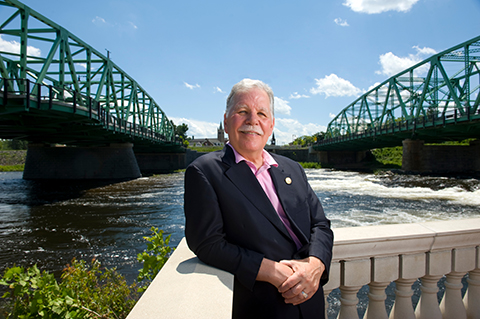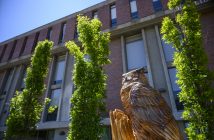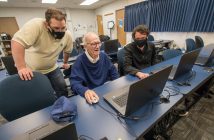Faculty and staff get involved in projects that enhance community life.
Bob Plasse is excited. As current assistant to the president at Westfield State and president of the local Westfield on Weekends nonprofit organization, he is quietly making a difference.
Plasse works to create “a University town” feel in Westfield, improving the overall well-being of the city on the way.
Like Plasse, many University faculty and staff are also pitching in in the community.
Here are just a few of their stories:
Robert Plasse, Assistant to the President
Westfield on Weekends, or “WOW” as it has become affectionately known, came into existence in late 2003 when a number of community volunteers were working to organize a local arts festival. Among them was now-president of WOW, Robert Plasse, the assistant to President Evan S. Dobelle.
Now in its 10th year, the nonprofit organization’s budget has grown, and the organization is “stronger than ever,” says Plasse.
WOW works with a number of the other local organizations to comprise a calendar of all local events, insisting the cause is more about working together and improving as a community than the expansion of the group itself.
“We’re working to make Westfield a destination,” says an enthusiastic Plasse, who helps to organize the group’s events, in addition to writing grants so that they may gain funding from the community.
Plasse looks forward to Harvest Days this fall, which include the annual Colonial Harvest Day and the Haunted Harvest pub and restaurant tour, in which participants are encouraged to dress in Halloween costumes and tour the local pubs.
This year’s tour will take place on Oct. 26 from 7-11 p.m. with a Haunted Hollywood theme. WOW encourages all to attend, from local residents to University students and alumni.
In his work dealing in internal communications at the University, Plasse has seen the involvement of faculty and staff in the community firsthand. In recent years, students have contributed to the downtown art gallery and have also assisted in the making of the weekly WOW local television show on channel 15, which Plasse hosts.
“A city is only as good as what the citizens bring to it,” says Plasse, who also speaks in the community about the importance of community programming and volunteerism.
He tells people that being a volunteer in the community can give a person the power to make a difference. And as Plasse will tell you, making a difference is “what it’s all about.”
Marijoan “MJ” Bull, Geography and Regional Planning
Marijoan “MJ” Bull joined the Friends of the Columbia Greenway in 2010. Since then, she has increased her level of involvement in the group and was recently named the organization’s director of planning, development and maintenance; she was also instrumental in gaining the group’s nonprofit status.
As a local bicyclist interested in improving both the safety and convenience of local biking, the professor of Geography and Regional Planning is adamant about the positive influence the Greenway will have on the community.
“I believe multi-use paths are one of the best investments communities can make. These facilities can do so much, such as serve as a transportation corridor for commuting to work or taking a trip to the post office or store,” she says. “Not only are the uses versatile, the users are diverse—from youngsters on bikes to the elderly on daily walks to mothers pushing carriages and serious cyclists racking up the miles.”
The Friends of the Columbia Greenway focuses on developing and maintaining the Columbia Greenway in Westfield and its surrounding areas, as well as pushing for more bicycle- and pedestrian-friendly aspects within the city. When finished, the Greenway will provide elevated views of urban areas, such as downtown Westfield, as well as scenic views of the local rivers and forests as it provides a safe route to admire the land.
In her planning, Bull has prompted local businesses to provide bike parking to prepare for bicyclists and other Greenway users who will be coming through the city. Bull cites the trail’s potential for drawing visitors in to the city, adding to the local economy in downtown Westfield.
In addition to the Greenway, the group also aims to improve other areas near the University, such as Western Avenue, by making them friendlier to bicyclists.
To blend what she is doing outside the classroom into the classroom, Bull challenged her students to write a Bicycle Plan in 2009 that would link the Greenway and Western Avenue. Her work helps to show her students the importance of getting involved, aiding their growth as professional regional planners.
It has also served as the inspiration for numerous students’ Regional Planning capstone projects, which serve as a practical application of their knowledge in the subject area.
Michael Young, Physical Science
Michael Young, an associate professor in Physical Science at Westfield State, first joined the Westfield River Watershed Association (WRWA) board in 1999. For him, it was a means of feeding an interest to get involved in areas concerning the environment and outdoor recreation.
Established in 1953, the nonprofit Watershed Association works to spread awareness in the community about its work, which focuses around protecting the watershed while improving its natural resources. Also focusing on the expansion of the land for outdoor recreational activities, WRWA turned out to be the perfect fit for Young.
“(The Watershed) contains substantial blocks of contiguous forest as well as high-quality streams and rivers, so there are quite a few opportunities for hiking, canoeing, fishing and other outdoor activities close by,” says Young.
Since joining, Young has served as the organization’s president for three years and as secretary for an additional three. He’s managed to do all this while also maintaining the group’s website.
His favorite event, the Atlantic Salmon Egg-Rearing Program (ASERP), ran from 2002 to the spring of 2013. Young led the charge each year in assisting local students in up to 10 local elementary and middle schools in raising a few hundred salmon eggs (per school) to the fry stage and releasing the fry back into local streams.
In assisting the local efforts, Young and contributing faculty and college students got involved in the hands-on work and were able to give back to younger students in the community.
More recently, Young has taken part in the storm drain-labeling program. Over the past three summers, the program has proved successful by raising awareness in the communities where local drains exist. Colorful labels mark drains that run straight to the Westfield River, making people think twice before they dispose of any foreign substances (pet waste, oil, etc.) in the drains.
Young says, “My work with WRWA has definitely given me a better perspective on the local environment.”
It has also given students better perspective as well.
Young’s work with the WRWA over the years has led to an increase in the amount of University students involved in recent years, seeing Westfield State students helping out with both the drain labeling and ASERP programs.
The string of University faculty members who have been a part of the organization is a bit longer, showing a history of great involvement from the University over the last 15 to 20 years.
This year Professor Brian Conz, who joined the group in 2010, was named the group’s president, while faculty members Aaron Reyes and Mark Damon are serving on the board.
For more info on Plasse, Bull and Young and the organizations for which they volunteer, check out their websites at westfieldonweekends.com, columbiagreenway.org and westfieldriver.org.




